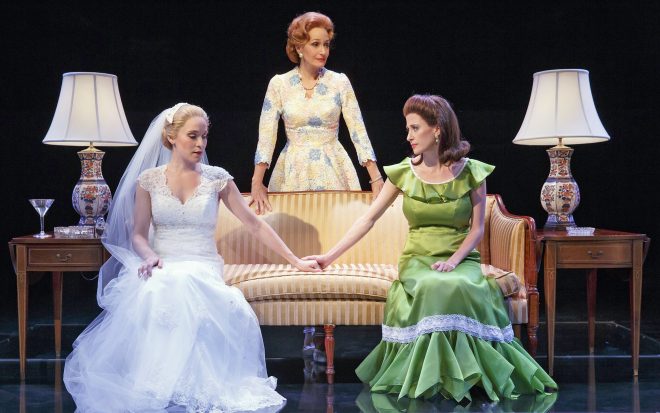
Let’s consider the work of the eclectic Broadway composer and lyricist who chooses unusual subjects, and sets them to music that’s intricate and intellectual, yet catchy.
Surprise: I’m not talking about Stephen Sondheim.
The man in question is Michael John LaChiusa. Born in July of 1962, he’s 32 years younger than Sondheim. He’s much more prolific, opening six shows in the past five years. LaChiusa is in a class with Sondheim as a creative composer but has not yet received similar fame.
His newest musical to be recorded is First Daughter Suite, on Ghostlight Records. The two-disc cast album was produced by Kurt Deutsch, Joel Moss and LaChiusa and includes a 44-page booklet with the libretto and liner notes by Oskar Eustis, the Public Theater’s artistic director.
First Daughter Suite is a continuation of his 1993 musical fantasy First Lady Suite that interwove the dreams and desires of certain American First Ladies.
“I decided that I wanted to write something that dealt with mothers and daughters,” LaChiusa said, “and nothing could be more fascinating than the relationships between First Ladies and First Daughters. For example, I looked at Pat Nixon and her daughters Trisha and Julie, and I chose Trisha’s wedding as the event because of the political stuff that was happening around them and to them at the time.”
He was referring to 1971 where, on one day, the New York Times reported on the Pentagon Papers alongside coverage of Tricia Nixon’s White House wedding to Edward Cox. According to LaChiusa, “There was this huge cake that was about to fall over. There was rain. They were moving the chairs inside and Martha Mitchell, the attorney general’s wife, came in this awful organza thing, totally upstaging the bride.”
The approach is wacky, yet it conveys unexpected empathy for these people and indicates how they became the way they were. The show starts with the ladies singing “Do you know what I wish for, in a house that will never be a home?”
First Daughter Suite is five vignettes about mother-daughter connections. It has a dream scene of Amy Carter with her mother Rosalynn, and Betty Ford and her daughter Susan. Also Nancy Reagan and her daughter Patti Davis and, as LaChiusa puts it, “Nancy’s gun-slinging Paraguayan maid, Anita.” In LaChiusa’s vision, Nancy is supercilious while Patti is rebellious: “You can’t shut me up; I’m not one of your servants.” The show concludes with Barbara Bush communing with the daughter she lost at an early age. The famous men are discussed but never seen or heard.
Barbara Walsh sounds superb as Pat Nixon, Alison Fraser is an appealing Betty Ford and a formidable Nancy Reagan, and Mary Testa is heart-breaking as Barbara Bush, while young singers flesh out the roles of their children.
Each scene has its own sound. The Nixon conflict uses operatic style. Amy Carter’s scene embodies children’s music. Nancy Reagan and Patti Davis’s confrontation is percussive, and Barbara Bush’s time-trip is melancholy. All the songs exhibit LaChiusa’s talent for accessible melodies combined with intricate musical structure.
Ghostlight also produced LaChiusa’s musical Giant, which played at New York’s Public Theater in 2012 with an exceptionally large cast of 26 actors, a 17-piece orchestra, and lush orchestrations by Bruce Coughlin, with additions by Larry Hochman.
Giant was the epic novel about Texas by Edna Ferber, who also described life along the Mississippi in Show Boat, which was adapted into the immortal musical by Oscar Hammerstein and Jerome Kern.
Giant follows three generations of a family that owns a huge cattle ranch. Bick Benedict (Bryan D’Arcy James) meets Leslie (Kate Baldwin) when he travels to Virginia to buy a horse from her father. The two fall quickly in love; they marry after only three weeks and he takes her to live on his family’s Texas ranch. She reads Thoreau and mistakenly believes that Texas is a place where everyone can be free and equal. Only later do the couple become aware of differences between them, and Leslie feels trapped in a world she does not understand.
The musical pits ranchers versus oil drillers, reminiscent of how Oklahoma! set its farmers against the cow men. Technological progress produces tension, plus conflict between father and son, and resistance to interracial marriage.
In its own way, Giant accomplished what Show Boat achieved in its opening scene by spotlighting the oppressed underclass. In the place of “Ol’ Man River” LaChiusa opens with a song in Spanish, “Aurelia Dolores,” which reminds us of the Mexican roots in Texas. Those Mexican people remain omnipresent, as servants and also as love interests.
“Did Spring Come To Texas?” is a tune whose sentiments recall “Oh What a Beautiful Mornin’” from Oklahoma! Like Show Boat and Oklahoma!, this show includes comic numbers (like “Topsy Turvey”), and a rousing paen to “country” that parallels the title song of Oklahoma! —“the land we belong to is grand.” Texans, of course, pride themselves on the fact that this was an independent country before it became a state.
Brian D’Arcy James sings a powerful soliloquy, “That Thing,” as a dad who loves his son and yet realizes that they have nothing in common.
Like those earlier classics, Giant espouses progressive causes while never condescending to the nativist culture of Texas. LaChiusa makes social points while treating the entrenched Texans warmly.
Other LaChiusa shows in the past five years include Queen of the Mist, a musical starring Mary Testa as the first person to survive going over Niagara Falls in a barrel, also available on Ghostlight. LaChiusa premiered two shows in Los Angeles — the non-musical Sukie and Sue and the musical Los Otros which pictures the lives of Mexican-Americans in contemporary Southern California, a collaboration with Ellen Fitzhugh and Graciela Daniele.
In March of 2016 San Diego saw the world premiere of Rain, a musical version of W. Somerset Maugham’s steamy classic about a prostitute who tries to remake her life in the tropics, with book by Sybille Pearson.
Ghostlight is to be commended for preserving the work of this master of music theater. The company continues to issue a wide range of new musicals, including Bright Star, Something Rotten and Venice, the stage version of The Hunchback of Notre Dame, and the revivals of Pippin and She Loves Me. 
Please share your thoughts with us. Address to editor@theculturalcritic.com